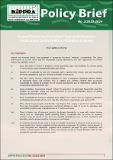| dc.description.abstract | Most countries, Kenya included, have been faced
with multiple economic turbulence since the onset of
Corona Virus Disease 2019 (COVID-19) pandemic.
Even before the COVID-19 pandemic could be
subdued, the Russian invasion of Ukraine began in
March 2022, exposing the world to high food and
energy prices. In Kenya, the two crises aggravated
a pre-existing situation, from way back in April 2019,
where food inflation had surpassed headline inflation.
This trend continued all through to June 2023 when
food inflation stood at 10.3 per cent. Persistent high
food inflation in the country is in part due to poor
performance of the agriculture sector which is prone
to weather-related shocks due to its heavy reliance
on rainfall.
Other than price-related shocks, households also
face health-related shocks, job losses, death of
leading income earners, climate-related shocks
among others. To cope with these shocks,
households adopt various strategies depending
on the nature of the shock. The commonly used
coping strategies expenditure cuts, relying on
social networks, and borrowing from informal credit
channels. In situations where income shocks persist
and are widespread, such coping mechanisms may
not be sustainable and may have negative effects on
household members, particularly children. | en |

